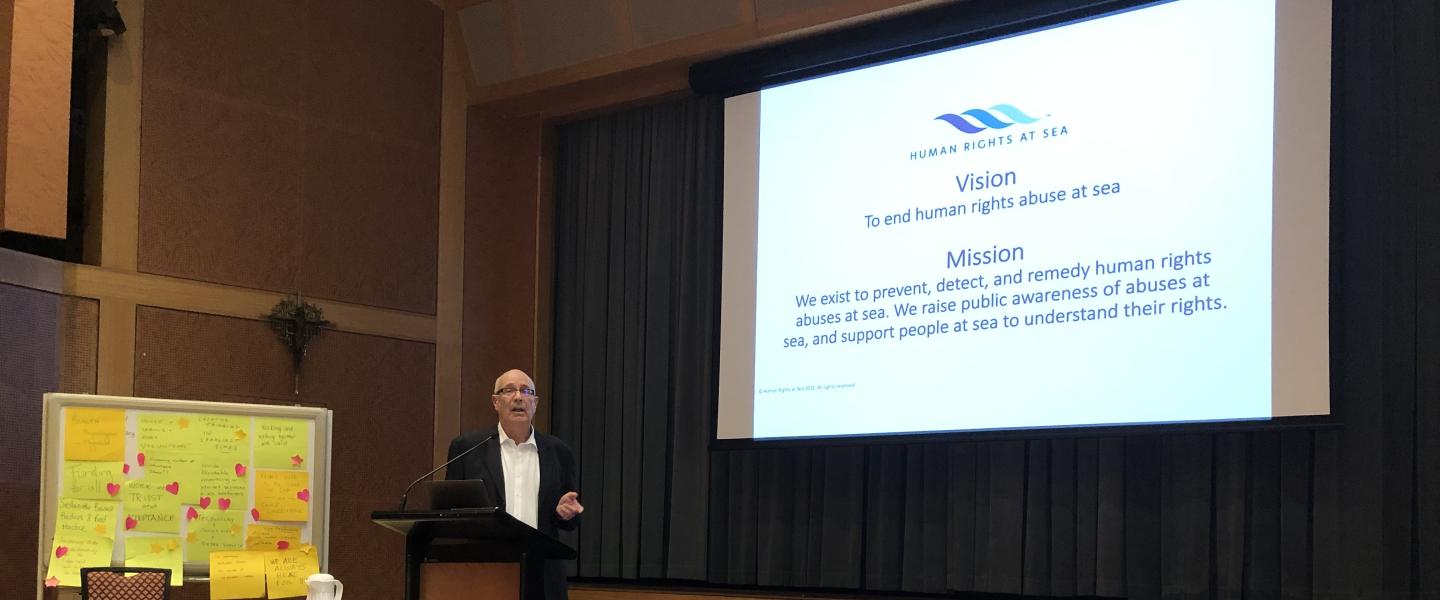Australian Seafarer Welfare Providers’ Conference Reporting: 23-26 November 2022
Seafarer welfare providers in ports around Australia have 'had it tough' over the last three years, Paul MacGillivary reports.
The COVID-19 pandemic first impacted the world in February 2020, bringing our lives into a new reality that no one had imagined. The maritime world was particularly affected, with extended port closures being imposed worldwide.
Meantime, Stella Maris and Mission to Seafarers have said that they have exhausted all their human and financial resources to continue caring for seafarers during the pandemic.
This event was therefore an opportunity for welfare providers to re-engage, reflect, and move towards a better future in providing services that support those key workers we rely so heavily upon.
Human Rights at Sea Advisory Board Member, Paul MacGillivary, gave the closing presentation on Day 1 of the conference on how port welfare committees (PWCs) can assist with the overall welfare of everyone in the port community.
Paul opened the discussion with the vision and mission of Human Rights at Sea and went on to outline the HRAS Maritime Levy Campaign, which is running concurrently with the Australian Seafarers’ Welfare Council’s initiative for sustainable welfare funding, and the need for all coastal states to reinforce their political will and national legislative pathways to assure sustainable and long-term welfare support in law through existing maritime levy structures.
He went on to discuss the history of PWCs in Australia and the challenges faced by seafarers during the pandemic, and how COVID-19 has shone a light on seafarer welfare that the public and governments can no longer ignore.
Also discussed, were the roles and objectives of Port Welfare Committees (PWCs) and how they provide a portal to the wider community, expanding the welfare centres’ sphere of influence.
The PWC drives change, improvements, and better support for the seafarer. But, most importantly, the PWC provides a network of expertise to deal with emergencies, as was experienced during the pandemic.
“COVID has shone a light on seafarer welfare that the public and governments can no longer ignore.”
It should be remembered that at the height of the so-called ‘crew change crisis’, around 400,000 seafarers were stranded on vessels at sea, some for more than 11 months. The crisis was later rightly declared a humanitarian crisis by the UN Secretary-General in September 2021, which was the first time that the UN SG had explicitly highlighted seafarers’ working conditions as both a human rights and humanitarian issue.
To coincide with Human Rights Day in December 2021, we published a comprehensive review of the impact of the pandemic entitled:
“Stamping of Seafarer’s Rights During the COVID-19 pandemic”.
The report, drafted by researcher and media lead, Abby Williams, identified 10 ways in which the human rights of seafarers were being abused because of the lack of response by states and businesses to the impact of the pandemic on the maritime sector.
Human Rights at Sea has consistently used the report to advocate for a better response by the government and industry to the unique circumstances that seafarers face.
Contact: Charlotte Rumbol, Communications Manager and Project Officer: charlotte.rumbol@humanrightsatsea.org
About Sharing. We welcome the use and dissemination of our work with proper accreditation. Please ensure that our Terms of Use are conformed with at all times.




